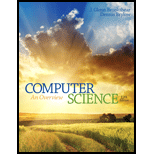
Computer Science: An Overview (12th Edition)
12th Edition
ISBN: 9780133760064
Author: Glenn Brookshear, Dennis Brylow
Publisher: PEARSON
expand_more
expand_more
format_list_bulleted
Concept explainers
Question
Chapter 11, Problem 50CRP
Program Plan Intro
Reasoning process:
The ability of mind to think in a logical way to achieve a goal state of any statement or start state called reasoning process.
Expert Solution & Answer
Want to see the full answer?
Check out a sample textbook solution
Students have asked these similar questions
using r language
using r language
The assignment here is to write an app using a database named CIT321 with a collection named
students; we will provide a CSV file of the data. You need to use Vue.js to display 2 pages. You should
know that this assignment is similar, all too similar in fact, to the cars4sale2 example in the lecture notes
for Vue.js 2. You should study that program first. If you figure out cars4sale2, then program 6 will be
extremely straightforward. It is not my intent do drop a ton of new material here in the last few days of
class.
The database contains 51 documents. The first rows of the CSV file look like this:
sid
last_name
1 Astaire
first_name
Humphrey CIT
major
hrs_attempted
gpa_points
10
34
2
Bacall
Katharine EET
40
128
3 Bergman
Bette
EET
42
97
4
Bogart
Cary
CIT
11
33
5 Brando
James
WEB
59
183
6 Cagney
Marlon
CIT
13
40
GPA is calculated as gpa_points divided by hrs_attempted. GPA points would have been arrived at by
adding 4 points for each credit hour of A, 3 points for each credit hour of…
Chapter 11 Solutions
Computer Science: An Overview (12th Edition)
Ch. 11.1 - Prob. 1QECh. 11.1 - Prob. 2QECh. 11.1 - Prob. 3QECh. 11.1 - Prob. 4QECh. 11.1 - Prob. 5QECh. 11.2 - Prob. 1QECh. 11.2 - Prob. 2QECh. 11.2 - Prob. 3QECh. 11.2 - Prob. 4QECh. 11.2 - Identify the ambiguities involved in translating...
Ch. 11.2 - Prob. 6QECh. 11.2 - Prob. 7QECh. 11.3 - Prob. 1QECh. 11.3 - Prob. 2QECh. 11.3 - Prob. 3QECh. 11.3 - Prob. 4QECh. 11.3 - Prob. 5QECh. 11.3 - Prob. 6QECh. 11.3 - Prob. 7QECh. 11.3 - Prob. 8QECh. 11.3 - Prob. 9QECh. 11.4 - Prob. 1QECh. 11.4 - Prob. 2QECh. 11.4 - Prob. 3QECh. 11.4 - Prob. 4QECh. 11.4 - Prob. 5QECh. 11.5 - Prob. 1QECh. 11.5 - Prob. 2QECh. 11.5 - Prob. 3QECh. 11.5 - Prob. 4QECh. 11.6 - Prob. 1QECh. 11.6 - Prob. 2QECh. 11.6 - Prob. 3QECh. 11.7 - Prob. 1QECh. 11.7 - Prob. 2QECh. 11.7 - Prob. 3QECh. 11 - Prob. 1CRPCh. 11 - Prob. 2CRPCh. 11 - Identify each of the following responses as being...Ch. 11 - Prob. 4CRPCh. 11 - Prob. 5CRPCh. 11 - Prob. 6CRPCh. 11 - Which of the following activities do you expect to...Ch. 11 - Prob. 8CRPCh. 11 - Prob. 9CRPCh. 11 - Prob. 10CRPCh. 11 - Prob. 11CRPCh. 11 - Prob. 12CRPCh. 11 - Prob. 13CRPCh. 11 - Prob. 14CRPCh. 11 - Prob. 15CRPCh. 11 - Prob. 16CRPCh. 11 - Prob. 17CRPCh. 11 - Prob. 18CRPCh. 11 - Give an example in which the closed-world...Ch. 11 - Prob. 20CRPCh. 11 - Prob. 21CRPCh. 11 - Prob. 22CRPCh. 11 - Prob. 23CRPCh. 11 - Prob. 24CRPCh. 11 - Prob. 25CRPCh. 11 - Prob. 26CRPCh. 11 - Prob. 27CRPCh. 11 - Prob. 28CRPCh. 11 - Prob. 29CRPCh. 11 - Prob. 30CRPCh. 11 - Prob. 31CRPCh. 11 - Prob. 32CRPCh. 11 - Prob. 33CRPCh. 11 - What heuristic do you use when searching for a...Ch. 11 - Prob. 35CRPCh. 11 - Prob. 36CRPCh. 11 - Prob. 37CRPCh. 11 - Prob. 38CRPCh. 11 - Suppose your job is to supervise the loading of...Ch. 11 - Prob. 40CRPCh. 11 - Prob. 41CRPCh. 11 - Prob. 42CRPCh. 11 - Prob. 43CRPCh. 11 - Prob. 44CRPCh. 11 - Prob. 45CRPCh. 11 - Prob. 46CRPCh. 11 - Prob. 47CRPCh. 11 - Prob. 48CRPCh. 11 - Draw a diagram similar to Figure 11.5 representing...Ch. 11 - Prob. 50CRPCh. 11 - Prob. 51CRPCh. 11 - Prob. 52CRPCh. 11 - Prob. 53CRPCh. 11 - Prob. 54CRPCh. 11 - Prob. 55CRPCh. 11 - Prob. 56CRPCh. 11 - Prob. 57CRPCh. 11 - Prob. 1SICh. 11 - Prob. 2SICh. 11 - Prob. 3SICh. 11 - Prob. 4SICh. 11 - Prob. 5SICh. 11 - Prob. 6SICh. 11 - Prob. 7SICh. 11 - Prob. 8SICh. 11 - Prob. 9SICh. 11 - Prob. 10SICh. 11 - Prob. 11SICh. 11 - Prob. 12SICh. 11 - A GPS in an automobile provides a friendly voice...Ch. 11 - Prob. 14SI
Knowledge Booster
Learn more about
Need a deep-dive on the concept behind this application? Look no further. Learn more about this topic, computer-science and related others by exploring similar questions and additional content below.Similar questions
- what is a feature in the Windows Server Security Compliance Toolkit, thank you.arrow_forwardYou will write a program that allows the user to keep track of college locations and details about each location. To begin you will create a College python class that keeps track of the csollege's unique id number, name, address, phone number, maximum students, and average tuition cost. Once you have built the College class, you will write a program that stores College objects in a dictionary while using the College's unique id number as the key. The program should display a menu in this order that lets the user: 1) Add a new College 2) Look up a College 4) Delete an existing College 5) Change an existing College's name, address, phone number, maximum guests, and average tuition cost. 6) Exit the programarrow_forwardShow all the workarrow_forward
- Show all the workarrow_forward[5 marks] Give a recursive definition for the language anb2n where n = 1, 2, 3, ... over the alphabet Ó={a, b}. 2) [12 marks] Consider the following languages over the alphabet ={a ,b}, (i) The language of all words that begin and end an a (ii) The language where every a in a word is immediately followed by at least one b. (a) Express each as a Regular Expression (b) Draw an FA for each language (c) For Language (i), draw a TG using at most 3 states (d) For Language (ii), construct a CFG.arrow_forwardQuestion 1 Generate a random sample of standard lognormal data (rlnorm()) for sample size n = 100. Construct histogram estimates of density for this sample using Sturges’ Rule, Scott’s Normal Reference Rule, and the FD Rule. Question 2 Construct a frequency polygon density estimate for the sample in Question 1, using bin width determined by Sturges’ Rule.arrow_forward
arrow_back_ios
SEE MORE QUESTIONS
arrow_forward_ios
Recommended textbooks for you
 Principles of Information Systems (MindTap Course...Computer ScienceISBN:9781285867168Author:Ralph Stair, George ReynoldsPublisher:Cengage LearningProgramming Logic & Design ComprehensiveComputer ScienceISBN:9781337669405Author:FARRELLPublisher:Cengage
Principles of Information Systems (MindTap Course...Computer ScienceISBN:9781285867168Author:Ralph Stair, George ReynoldsPublisher:Cengage LearningProgramming Logic & Design ComprehensiveComputer ScienceISBN:9781337669405Author:FARRELLPublisher:Cengage C++ Programming: From Problem Analysis to Program...Computer ScienceISBN:9781337102087Author:D. S. MalikPublisher:Cengage Learning
C++ Programming: From Problem Analysis to Program...Computer ScienceISBN:9781337102087Author:D. S. MalikPublisher:Cengage Learning LINUX+ AND LPIC-1 GDE.TO LINUX CERTIF.Computer ScienceISBN:9781337569798Author:ECKERTPublisher:CENGAGE L
LINUX+ AND LPIC-1 GDE.TO LINUX CERTIF.Computer ScienceISBN:9781337569798Author:ECKERTPublisher:CENGAGE L Operations Research : Applications and AlgorithmsComputer ScienceISBN:9780534380588Author:Wayne L. WinstonPublisher:Brooks Cole
Operations Research : Applications and AlgorithmsComputer ScienceISBN:9780534380588Author:Wayne L. WinstonPublisher:Brooks Cole C++ for Engineers and ScientistsComputer ScienceISBN:9781133187844Author:Bronson, Gary J.Publisher:Course Technology Ptr
C++ for Engineers and ScientistsComputer ScienceISBN:9781133187844Author:Bronson, Gary J.Publisher:Course Technology Ptr

Principles of Information Systems (MindTap Course...
Computer Science
ISBN:9781285867168
Author:Ralph Stair, George Reynolds
Publisher:Cengage Learning

Programming Logic & Design Comprehensive
Computer Science
ISBN:9781337669405
Author:FARRELL
Publisher:Cengage

C++ Programming: From Problem Analysis to Program...
Computer Science
ISBN:9781337102087
Author:D. S. Malik
Publisher:Cengage Learning

LINUX+ AND LPIC-1 GDE.TO LINUX CERTIF.
Computer Science
ISBN:9781337569798
Author:ECKERT
Publisher:CENGAGE L

Operations Research : Applications and Algorithms
Computer Science
ISBN:9780534380588
Author:Wayne L. Winston
Publisher:Brooks Cole

C++ for Engineers and Scientists
Computer Science
ISBN:9781133187844
Author:Bronson, Gary J.
Publisher:Course Technology Ptr